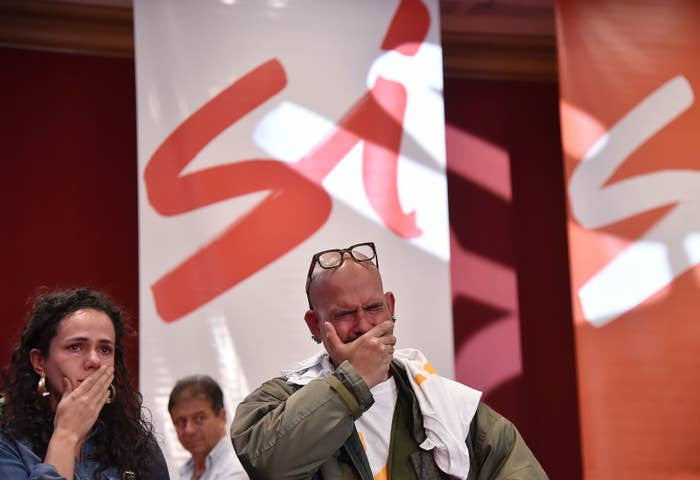
Colombian voters opted to reject a peace deal that was meant to end 50 years of conflict with leftist rebels, leaving the country on uncertain footing moving forward.
Voters took to the polls throughout the country on Sunday faced with a simple choice, voting "yes" on "no" on whether to accept the government's peace deal as negotiated with the Armed Revolutionary Forces of Colombia (FARC). With 99.85% of the vote counted on Sunday afternoon, the "No" vote had taken the lead at 50.22%, according to official government numbers.
"The bilateral and final ceasefire is still standing," Colombian President Juan Manuel Santos, said during a televised speech from the official residence following the results' announcement. "Tomorrow I will convene the political forces, in particular the ones in favor of 'no,' to listen them and determine which path to follow. ... I will not give up,"
FARC leader Timoleon Jimenez also said that his group remains willing to work towards peace. "The FARC-EP maintain their desire for peace and reiterate their disposition to use only words as a weapon to build the future," a statement from the FARC released Sunday evening read. "The Colombian people who dreams of peace that rely on us. Peace will triumph."
On Monday, President Juan Manuel Santos and the FARC signed the final peace agreement in Cartagena before more than a dozen Latin American heads of state. More than 220,000 people were killed and nearly 7 million were displaced from their homes as the conflict dragged on and peace negotiation after peace negotiation over the years failed, with this year’s agreement meant to finally break the cycle.
Ahead of the referendum, polls showed as much as 72% of Colombians in support of the deal that was announced in August. Since the terms of the deal were first presented, however, opponents have come from numerous corners to claim that the conditions grant the FARC impunity for their crimes, because of lack of proper prison sentences for FARC soldiers and a provision offering automatic seats in Colombia's Congress to the former rebels.
Former President Alvaro Uribe led the charge against the deal's terms, posting numerous videos calling on Colombians to vote "no" to his Twitter account:
#SalvaElPaisVotaNo Salvemos a Colombia, Votemos NO
Leading human rights advocacy group Human Rights Watch also urged against the deal's acceptance. The organization's Americas Director turned down an invitation to attend the signing of the peace deal, penning an open letter to President Santos to urge him to insert more consequences for those who committed atrocities on both sides during the conflict.
Adding to the outcome were record low turnouts for the vote — fewer than 40% of registered voters went to the polls — with the arrival of Hurricane Matthew likely keeping people indoors.
A map of polarization: Those unaffected by war said "no" to peace in Colombia, those ravaged by war said "yes".
The deal's rejection was unforeseen but doesn't necessarily mean a resumption of hostilities. "A 'no' vote is not a vote against peace but against this particular accord," Adam Isaacson, a Colombia expert with the Washington Office on Latin America, told BuzzFeed News.
Peace negotiations presided by Cuba and Norway have been ongoing for four years in Havana, Cuba. FARC negotiators said ahead of the vote that they were not interested in renegotiating the terms of the peace deal. Both sides have previously insisted that there is no Plan B in place at this time.


